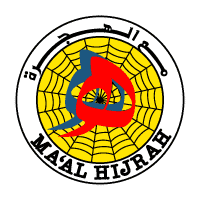 What is the Hijrah Calendar?
What is the Hijrah Calendar?Muslims do not traditionally "celebrate" the beginning of a new year, but we do acknowledge the passing of time, and take time to reflect on our own mortality.
Muslims measure the passage of time using the Islamic (Hijrah) calendar. This calendar has twelve lunar months, the beginnings and endings of which are determined by the sighting of the crescent moon. Years are counted since the Hijrah, which is when the Prophet Muhammad migrated from Mecca to Madinah (approximately July 622 A.D.).
The Islamic calendar was first introduced by the close companion of the Prophet, 'Umar ibn Al-Khattab. During his leadership of the Muslim community, in approximately 638 A.D., he consulted with his advisors in order to come to a decision regarding the various dating systems used at that time. It was agreed that the most appropriate reference point for the Islamic calendar was the Hijrah, since it was an important turning point for the Muslim community. After the emigration to Madinah (formerly known as Yathrib), the Muslims were able to organize and establish the first real Muslim "community," with social, political, and economic independence. Life in Madinah allowed the Muslim community to mature and strengthen, and the people developed an entire society based on Islamic principles.
The Islamic calendar is the official calendar in many Muslim countries, especially Saudi Arabia. Other Muslim countries use the Gregorian calendar for civil purposes and only turn to the Islamic calendar for religious purposes.
(Reference from :Islam.about.com )
Muslims measure the passage of time using the Islamic (Hijrah) calendar. This calendar has twelve lunar months, the beginnings and endings of which are determined by the sighting of the crescent moon. Years are counted since the Hijrah, which is when the Prophet Muhammad migrated from Mecca to Madinah (approximately July 622 A.D.).
The Islamic calendar was first introduced by the close companion of the Prophet, 'Umar ibn Al-Khattab. During his leadership of the Muslim community, in approximately 638 A.D., he consulted with his advisors in order to come to a decision regarding the various dating systems used at that time. It was agreed that the most appropriate reference point for the Islamic calendar was the Hijrah, since it was an important turning point for the Muslim community. After the emigration to Madinah (formerly known as Yathrib), the Muslims were able to organize and establish the first real Muslim "community," with social, political, and economic independence. Life in Madinah allowed the Muslim community to mature and strengthen, and the people developed an entire society based on Islamic principles.
The Islamic calendar is the official calendar in many Muslim countries, especially Saudi Arabia. Other Muslim countries use the Gregorian calendar for civil purposes and only turn to the Islamic calendar for religious purposes.
(Reference from :
 Black-Naped Oriole tried to open the banana leave roll which contain insect or larvae
Black-Naped Oriole tried to open the banana leave roll which contain insect or larvae She banged it to the branch..
She banged it to the branch.. My son catch this Eurasian Tree Sparrow feeding her chick. The exposure is wrong (+2EV), which I set for open sky highlight. I save the pic with Adobe Photoshop.
My son catch this Eurasian Tree Sparrow feeding her chick. The exposure is wrong (+2EV), which I set for open sky highlight. I save the pic with Adobe Photoshop.He waited patiently and managed to captured the wright moment. The shutter speed was only 1/40, so his fingers were really soft.
Well done FIRDAUS! (a budding birder and photographer). I will teach him the basic of exposure some day.



 Jungle Crow or Large-billed Crow (Corvus macrorhynchos)
Jungle Crow or Large-billed Crow (Corvus macrorhynchos)This gagak paruh besar rarely visited my backyard. Only twice so far, and today I got him, but not a perfect shot
 It is different from House Crow, which has much slender bill
It is different from House Crow, which has much slender bill
 Caught in the act.
Caught in the act.You see the bird dropping down there there!

No comments:
Post a Comment